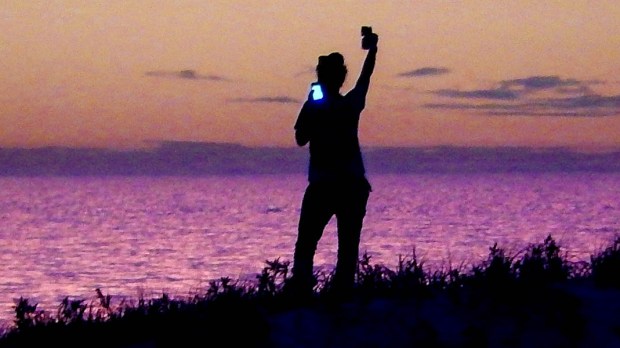Over the last couple of years there has been increased coverage of our society’s unbridled and unrelenting pursuit of technological innovation, from the waxing use of genome editing technology like CRISPR-Cas9 to the impending “singularity,” an epochal moment where machines will become (supposedly) conscious. While it’s no doubt important for our leaders, policy-makers, and scientists to consider these pending realities, it seems there is a subtler and perhaps equally detrimental aspect of our modern technological products and services that I would like to consider — namely, mobile phones, tablets, and social media platforms.
Much of our motivation to design intricate new phones and digital “personalities” that go by the name of Alexa or Siri boils down to appending greater convenience and comfort to our day-to-day life. On a macro level we certainly care about advances in medicine that can alleviate human suffering and the creation of “knowledge economy” jobs that elevate the labor force. However, we also want software that can make the online shopping cart process a more pleasant and quicker experience, home devices that respond to voice commands rather than requiring kinetic effort, and platforms that feed us customized and relevant entertainment options before we even know we want them. Now, I don’t see anything amiss with this motivation, per se, but my question is this: At what point does the fostering of mere convenience begin to enervate the formation of certain virtues that help make up a meaningful and flourishing life?
In other words, if technology is to help me become more human, then what good is a machine that only turns me into one by depriving opportunities to choose kindness, patience, prudence, courage, and so on?
I consider my own experiences, and how over the last few years my life has become “more convenient” thanks to a number of iterative improvements in the realm of everyday living. Today I can employ UberEATS to deliver hot meals from almost any restaurant of my choosing, eliminating the need to patiently endure the monotony of stop signs and flashing brake lights. I can shoot a smiling emoji with heart-eyes to a woman on a dating app and omit an opportunity to muster the courage for an in-person compliment. I can wrest my phone from my pocket to skim the news while in line at the grocery store, curtailing a chance to strike up a friendly conversation with the person behind me.
Of course, these are minor, seemingly harmless adjustments to my life: single, benign instances that don’t raise any red, or even yellow, flags in and of themselves. Am I truly gaining something by saying hello to the barista at Starbucks before ordering my drink instead of ordering it on my app and having it ready for me on the counter when I walk in? Is my waiting in line and interacting with a person for a mere two minutes really derailing my commitment to a virtuous and meaningful life? Probably not. But my concern takes form when these instances are taken in the aggregate. As a result of these countless small conveniences that fill my day, I now have to work a bit harder to place myself in situations that require patience, courage, and kindness.
According to Aristotle some millennia ago, in order to be happy — to be fulfilled in a lasting, pervasive, and meaningful way — we must demonstrate, again and again, instances of victory over our passions by disciplining habits aimed at the good. Aristotle likely had in mind ascending a well-guarded hill in the throes of battle when he was talking about fostering courage, as opposed to simply opting for a face-to-face conversation with someone instead of a digitally mediated one, but still. There is something that I think we need to be aware of. The more we settle into a life mottled by convenience, the less we are required to foster certain habits that lead to us being more virtuous and well-rounded people. And since we will only continue to enjoy (or, perhaps, suffer?) ever more conveniences in the future, we might have to make more of an intentional effort. As much as I wish it was so, I know I can’t curb my laziness by skimming a Facebook article that reads “5 Ways to Beat Laziness,” but as Aristotle advised, by engaging in behaviors at the extreme pole of our vices, such as one does when straightening a bent stick.
The solution probably isn’t to cast such technologies out the window, since I know it isn’t the instrument but the one who wields it, at least in my case, that is lacking. Instead of the rise of agonistic sentient machines we may already be facing something nearly as deleterious: a generation of mediocre and tepid people conditioned to living lives that aren’t fulfilling or meaningful. The less we’re able to resist our urge to take the easier road in small matters, the less we might be able to do so when it really matters: to see with clarity the good and move toward it with acts of sacrifice, commitment, and passion.
Being able to accept the gift of technological development seemingly presupposes the very virtues our technology is preventing us from honing. What good is convenience and an endless repository of goods if it doesn’t lead to my happiness, or “eudaimonia” as the ancient philosophers understood? I remain conflicted, as I acknowledge our society’s incessant extolling of technological production has allowed me to be born into a world of vaccines, comfortable mattresses, and perfectly heated lattes. But still, something seems off. While I can’t help but keep an eye on the more sensational and science fiction-esque possibilities of technology that are redolent of Brave New World, we might want to not forget about the obstacles to lasting happiness that our tech-focused ingenuity has already created.

